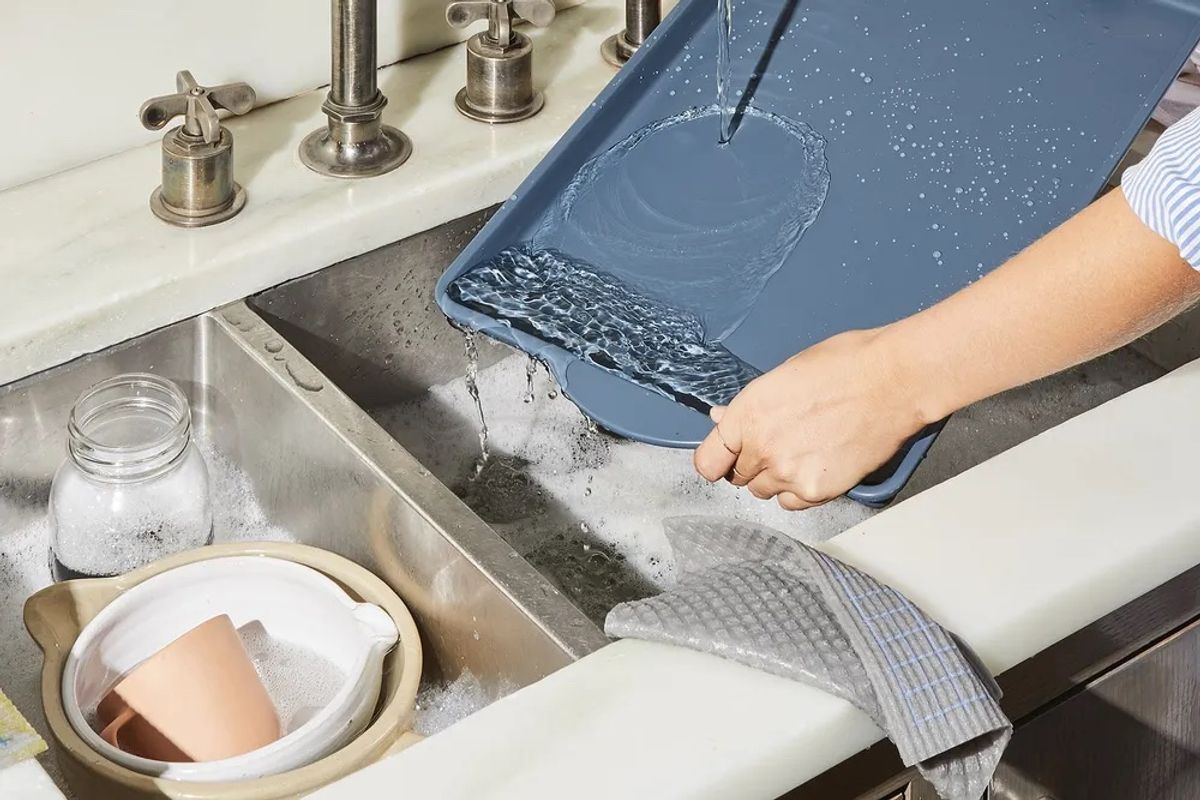As much as I love to cook, cleaning my kitchen is one of my most dreaded—even feared—household tasks. It doesn't take long for dishes to pile up, my limited pantry space is a jumble of spices and jars, and my dirty pans sit on the stove longer than I'd like to admit. I'd pretty much given up on remedying the situation—that is, until I spoke to three cooking pros about their smartest, cleverest, and most-trusted techniques for kitchen cleaning. From general words of wisdom to specific, practical tips, the advice from these chefs has reminded me that keeping my kitchen clean doesn't have to be (such) a chore.
1. Stay Organized
You may think this goes without saying, but it's so important that I'm saying it anyway: Staying organized is the first step to improving your kitchen clean-up process. "The biggest mistake I see home cooks make is not staying organized from the get go," says Caroline Schiff, acclaimed pastry chef at Brooklyn's Gage & Tollner. "The process of mise en place, which is a restaurant standard practice, keeps you neat and organized as you work," she explains. "Starting off this way means the whole process will be more streamlined—even clean-up."
To begin, Schiff recommends "[decanting] ingredients into clear containers," which then get dated and labeled. "We do this in professional kitchens and it keeps you so tidy and organized, plus you can see when you're running low on an ingredient or when something might be past its prime," she says. Schiff also recommends keeping a roll of blue painter's tape and a permanent marker in your kitchen to make labeling a breeze.
An essential part of staying organized in the kitchen is cleaning up as you go. According to Drew Keane, chef de cuisine at Cabra Chicago, doing so "always makes the final clean-up very easy" and "[keeps] your mind focused" as you cook. Specifically, says Keane, it's essential to "wash your tools in-between uses to prevent cross-contamination."
2. Invest In A Bench Scraper
Anna Billingskog, Food52's food stylist extraordinaire, relies on an affordable, accessible tool to make the kitchen clean-up process easier. "The bench scraper is the unsung hero of my prep and cooking zone," Billingskog says. "It's helpful for picking up your odds and ends [like] vegetable scraps and getting them neatly into the compost bin, or for helping pick up some finely chopped herbs off your board and getting it all into the pan at once." Beyond being handy and efficient, bench scrapers are extremely satisfying to use—which may make you more inclined to use them for clean-up duties.
When you're picking out a bench scraper "the less expensive [ones] work the best," says Billingskog. Just look for something that has some slight bend in the material—that flexibility will help you pick up all of those bits and pieces left on your cutting board.
3. Use Leftover Lemons
Once you've used your bench scraper to remove any debris from your cutting board, this trick can help eliminate lingering odors (particularly from garlic and onion) on your board. "When a recipe calls for the juice of half a lemon, I save the other half and rub it cut side down on my board with a little kosher salt (just enough to make a paste)," Billingskog says. While the lemon deodorizes any unwanted smells, the salt scrapes off any remaining residue.
Once you've deodorized and scrubbed your cutting board, don't forget to give it—and the rest of your station—a good wash, especially if you've been working with raw proteins. "I'd always recommend…using a different work area or separate cutting board while handling [poultry]," says Keane. Once you're done, "wash your whole station down, then move onto your next project."
4. Sheet Pans Are Your Friend
If you've ever baked a cake or fruit pie only to have it bubble over the sides of the pan and onto the bottom of your oven, this one's for you. No matter what you're baking—whether it's a cake or casserole—Schiff recommends putting the dish on a parchment-lined sheet pan to catch any spills. From there, clean-up is easy: "Just toss the parchment and give [the sheet pan] a quick rinse—no scrubbing necessary," Schiff says. "I do this at work and at home and it's so helpful."
5. Burnt Pans *Can* Be Saved
Lastly, when disaster strikes, your pots and pans are typically not beyond repair. If you burn the bottom of a pan, according to Billingskog, it's likely salvageable. "Boiling some water in [the pot] with a little baking soda will begin to loosen most burnt-on foods [and] stains," she says. From there, just clean the pan as you normally would—hours of scrubbing not required.




Shares